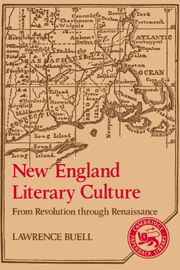Book contents
- Frontmatter
- Contents
- Acknowledgments
- Abbreviations of Frequently Cited Works
- PART I FOUR OVERVIEWS
- PART II THREE REPRESENTATIVE GENRES
- PART III REINVENTING PURITANISM: THE NEW ENGLAND HISTORICAL IMAGINATION
- 8 The Concept of Puritan Ancestry
- 9 The Politics of Historiography
- 10 Fictionalizing Puritan History: Some Problems and Approaches
- 11 Hawthorne and Stowe as Rival Interpreters of New England Puritanism
- Part IV NEW ENGLAND AS A COUNTRY OF THE IMAGINATION: THE SPIRIT OF PLACE
- Postscript
- Appendix Vital Statistics: A Quantitative Analysis of Authorship as a Profession in New England
- Notes
- Index
9 - The Politics of Historiography
Published online by Cambridge University Press: 15 October 2009
- Frontmatter
- Contents
- Acknowledgments
- Abbreviations of Frequently Cited Works
- PART I FOUR OVERVIEWS
- PART II THREE REPRESENTATIVE GENRES
- PART III REINVENTING PURITANISM: THE NEW ENGLAND HISTORICAL IMAGINATION
- 8 The Concept of Puritan Ancestry
- 9 The Politics of Historiography
- 10 Fictionalizing Puritan History: Some Problems and Approaches
- 11 Hawthorne and Stowe as Rival Interpreters of New England Puritanism
- Part IV NEW ENGLAND AS A COUNTRY OF THE IMAGINATION: THE SPIRIT OF PLACE
- Postscript
- Appendix Vital Statistics: A Quantitative Analysis of Authorship as a Profession in New England
- Notes
- Index
Summary
Historical writing has always been an instrument of party warfare.
Michael Kraus, The Writing of American History (1953)There are plenty of people in our day who know, or seem to know, just what our Puritan fathers would be, were they to live in this age of the world. … But it very much lessens the value of such knowledge to find hardly any two exactly agreed about it; and, especially, to find that each one's own peculiar notions of morals and religion and theology are just the notions which he is sure those fathers would now adopt and teach.
Joseph S. Clark, A Historical Sketch of the Congregational Churches in Massachusetts (1858)Between the Revolution and the Civil War, historiography about Puritanism was spearheaded by New England Protestants of Puritan descent and particularly by those affiliated with one of the lineal descendants of the Puritan Congregational church. These historians, ranging from amateur fumblers to serious researchers whose work set the contemporary standard of scholarly rigor, assembled, preserved, and at times mutilated an immense amount of data still assiduously mined today; provided the key sources for the historical portions of period oratory and historical literature; and set or at least anticipated the agenda of later historical inquiry and the basic ideological perspectives that have governed modern scholarship on Puritanism.
Most of this early work now looks shallow and repetitious. But it is rarely dull.
- Type
- Chapter
- Information
- New England Literary CultureFrom Revolution through Renaissance, pp. 214 - 238Publisher: Cambridge University PressPrint publication year: 1986



